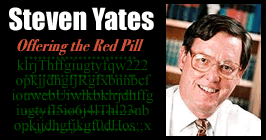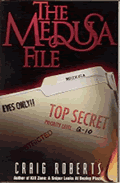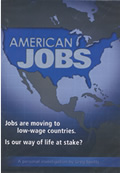Other
Yates
Articles:
Coming Soon
"TAKING
THE RED PILL"
THE
REAL MATRIX, PART 3
By
Steven Yates
December 7, 2004
NewsWithViews.com
This state of affairs did not develop overnight. This much should be clear. What is behind it?
Within any society, there appears to be a minority that thinks in terms of power and measures the worth of all actions in terms of whether they increase the personal reach of the actors and increase their capacity for control. This is why practically every society of any size is hierarchical, and why hierarchy is never eliminated, only replaced by a different hierarchy�the same wine in a new bottle.
Where to begin the story is a tough question. Some would cite the Bavarian Illuminati, started by a renegade Jesuit priest named Adam Weishaupt in 1776, the same year our Declaration of Independence was written. Weishaupt, however, found financial support through the Rothschild banking empire. The European bankers had discovered fractional reserve banking and the fine art of creating �wealth� out of thin air. They had learned they could exercise control over governments by loaning them money at interest and then extending the loans�attaching conditions to the extensions. The Rothschilds were the first internationalists of the incipient industrial era. They had established banks in five centers of influence: London (England), Paris (France), Frankfurt (Germany), Vienna (Austria) and Naples (Italy). These banks cooperated closely with one another, and they doubtless wielded enormous influence on the course European history took during the 1800s. J.P. Morgan became the American equivalent, eventually followed by the Rockefeller clan. John D. Rockefeller Sr. had made a fortune running Standard Oil. His children soon learned that there were even larger fortunes to be made in banking, and in socking as much money as possible into tax-exempt foundations created in the wake of the founding of the Internal Revenue Service in 1913. But alas, I get ahead of myself.
There are people who believe that the group Weishaupt founded still exists, and is still orchestrating all the more recent secret or semi-secret organizations from behind the scenes. Others would hold out for the Freemasons, with which Weishaupt had been involved. I have not been able to produce any original documentation supporting such theses (Weishaupt�s group was in fact outlawed in his own country in 1785). But secrecy was around in the form of the Skull & Bones organization founded at Yale in 1832. Numerous members of this group became prominent bankers, businessmen, ambassadors, other government officials, and so on, down through the ages. Antony Sutton argues in America�s Secret Establishment that Skull & Bones has been at the center of it all since its being brought to this country from Europe (specifically and interestingly: Germany). Skull & Bones still exists, of course. Both George W. Bush and John Kerry are members.
We know that a man named John Ruskin came to Oxford University to teach fine arts in 1870, and that he had a social philosophy of reform that took English upper-class youth by storm. Ruskin taught that English upper-class values needed to be extended to the masses and spread worldwide. The English upper classes would need to redistribute at least some of their wealth, or face the overwhelming of English civilization by an uncontrollable �rabble.� Karl Marx had preached that the violent overthrowing of capitalism was historically inevitable. Ruskin�s response: Marxian upheavals were preventable, but only by undertaking the immense project of extending English upper-class wealth and values as a means of remaining in control. In other words, create a global empire with Great Britain at its helm.
Ruskin�s most famous pupil was Cecil Rhodes. Rhodes kept the notes he�d taken on certain of Ruskin�s lectures with him the rest of his life. Other students of Ruskin�s were Alfred Milner and Arnold Toynbee. Rhodes became a multibillionaire mining gold and diamonds in South Africa (he received support, interestingly, from Lord Rothschild and later from Alfred Beit, an immensely wealthy German-born financier who became his partner in De Beers Consolidated Mines). We know that prior to his death, Rhodes willed a substantial portion of his fortune to the creation of the Rhodes Scholarship program mentioned above. Less well known is that in five previous wills he wrote of setting up a secret society the long-term goal of which was to create world government: �the extension of British rule throughout the world� including �the ultimate recovery of the United States of America as an integral part of the British Empire ��
Rhodes�s secret society was in
fact organized in 1891 (Lord Rothschild was one of its members, as
were Milner and Toynbee). Rhodes and those he recruited for his project
believed that furthering this kind of plan was the only means of putting
an end to war and extending the British Empire worldwide. Thus were
the Round Table Groups Carroll Quigley mentioned begun. Milner took
over following Rhodes�s death in 1902. According to Quigley (Tragedy
and Hope, p. 132), these groups �still function in eight countries.�
Quigley pursues in vivid detail the careers of the major players in
The Anglo-American Establishment. With the reputations made
possible by Oxford educations and enormous financial resources at
their disposal, the men running the Round Table Groups literally became
�the establishment��despite the fact that except for Rhodes and Toynbee
their names remained almost unknown. The anonymity did not bother
them. They did not want fame. They wanted power.
Steven Yates is an independent scholar who earned his Ph.D. in philosophy in 1987. He is the author of Civil Wrongs: What Went Wrong With Affirmative Action (San Francisco: ICS Press, 1994), Worldviews: Christian Theism versus Modern Materialism (Columbia, SC: Worldviews Project, due out in early 2005); and a co-author of The Free Person and the Free Market (Lanham, Md.: Lexington Books, 2002).
He is also an adjunct scholar with the Ludwig von Mises Institute. He has also worked as a clerk in a state agency, written obituaries for the local newspaper, earned a public health degree from the University of South Carolina (1999), done a stint as the writer, editor and consultant for the South Carolina Cancer Research Network writing the organization's Cancer Research Needs Report (2004), and worked as a customer service representative doing computer technical support.
He has other projects underway, including a science fiction novel. Most recently he joined the Stratia Corporation as a consultant and formed the Worldviews Project to further public discussion of the issues between the Christian worldview and that of modern materialism. He lives in Columbia, South Carolina.
E-Mail syates2@bellsouth.net.
There are people who believe that the group Weishaupt founded still exists, and is still orchestrating all the more recent secret or semi-secret organizations from behind the scenes. Others would hold out for the Freemasons, with which Weishaupt had been involved.








